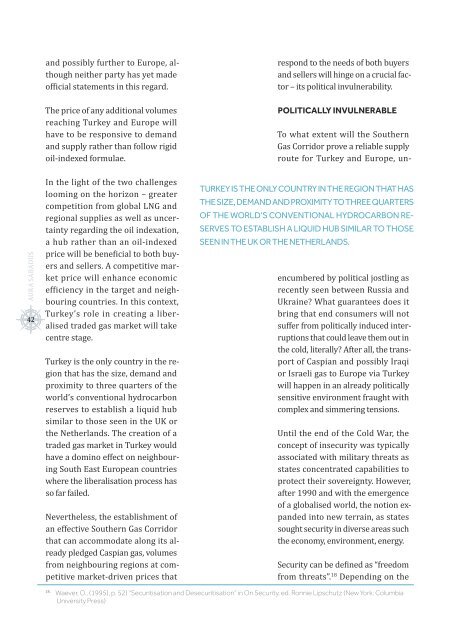Caspian Report - Issue: 07 - Spring 2014
Create successful ePaper yourself
Turn your PDF publications into a flip-book with our unique Google optimized e-Paper software.
and possibly further to Europe, although<br />
neither party has yet made<br />
official statements in this regard.<br />
The price of any additional volumes<br />
reaching Turkey and Europe will<br />
have to be responsive to demand<br />
and supply rather than follow rigid<br />
oil-indexed formulae.<br />
respond to the needs of both buyers<br />
and sellers will hinge on a crucial factor<br />
– its political invulnerability.<br />
Politically invulnerable<br />
Aura Sabadus<br />
42<br />
In the light of the two challenges<br />
looming on the horizon – greater<br />
competition from global LNG and<br />
regional supplies as well as uncertainty<br />
regarding the oil indexation,<br />
a hub rather than an oil-indexed<br />
price will be beneficial to both buyers<br />
and sellers. A competitive market<br />
price will enhance economic<br />
efficiency in the target and neighbouring<br />
countries. In this context,<br />
Turkey’s role in creating a liberalised<br />
traded gas market will take<br />
centre stage.<br />
Turkey is the only country in the region<br />
that has the size, demand and<br />
proximity to three quarters of the<br />
world’s conventional hydrocarbon<br />
reserves to establish a liquid hub<br />
similar to those seen in the UK or<br />
the Netherlands. The creation of a<br />
traded gas market in Turkey would<br />
have a domino effect on neighbouring<br />
South East European countries<br />
where the liberalisation process has<br />
so far failed.<br />
Nevertheless, the establishment of<br />
an effective Southern Gas Corridor<br />
that can accommodate along its already<br />
pledged <strong>Caspian</strong> gas, volumes<br />
from neighbouring regions at competitive<br />
market-driven prices that<br />
Turkey is the only country in the region that has<br />
the size, demand and proximity to three quarters<br />
of the world’s conventional hydrocarbon reserves<br />
to establish a liquid hub similar to those<br />
seen in the UK or the Netherlands.<br />
To what extent will the Southern<br />
Gas Corridor prove a reliable supply<br />
route for Turkey and Europe, unencumbered<br />
by political jostling as<br />
recently seen between Russia and<br />
Ukraine What guarantees does it<br />
bring that end consumers will not<br />
suffer from politically induced interruptions<br />
that could leave them out in<br />
the cold, literally After all, the transport<br />
of <strong>Caspian</strong> and possibly Iraqi<br />
or Israeli gas to Europe via Turkey<br />
will happen in an already politically<br />
sensitive environment fraught with<br />
complex and simmering tensions.<br />
Until the end of the Cold War, the<br />
concept of insecurity was typically<br />
associated with military threats as<br />
states concentrated capabilities to<br />
protect their sovereignty. However,<br />
after 1990 and with the emergence<br />
of a globalised world, the notion expanded<br />
into new terrain, as states<br />
sought security in diverse areas such<br />
the economy, environment, energy.<br />
Security can be defined as “freedom<br />
from threats”. 18 Depending on the<br />
18.<br />
Waever, O., (1995), p. 52) “Securitisation and Desecuritisation” in On Security, ed. Ronnie Lipschutz (New York: Columbia<br />
University Press)










